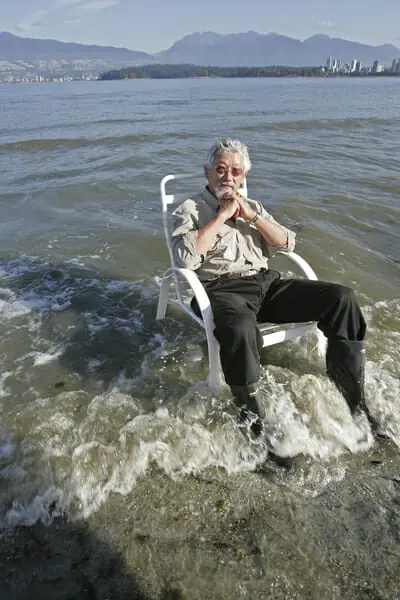My first impression of the man is that he’s sick. His coughs and sneezes come thick and fast. I’m standing beside David Suzuki at the Confederation Centre of the Arts in Charlottetown, P.E.I. as he prepares to receive the Symons Medal and deliver the 10th annual Symons Lecture.
The Symons Medal celebrates a distinguished Canadian’s unique contribution to the public good and evolution of Canada. It’s not hard to see why Suzuki was chosen. He is an elder, with wisdom to share.
David Suzuki is now in his mid 70s, what he calls the “death zone,” and his focus is his legacy for his grandchildren. The core message of his lecture in Charlottetown was that humans have become a geological force altering the physical, chemical and biological planet. An exploding population and drive for greater global economic growth is altering our world in ways we choose to ignore and with catastrophic outcomes we choose not to contemplate.
Suzuki described how many of his environmental victories in previous decades—such as protecting habitat by stopping dams on the Peace River and in the Amazon—have now been overturned by the relentless force of economic growth.
These victories were short-lived, says Suzuki, because people place the so-called ‘laws of economics’ above the laws of nature, and the collective imperative of a healthy environment: clean air, clean water and a sustainable earth. Accordingly, Suzuki has shifted his approach.
Suzuki presents a ‘paradigm shift.’ He hopes to redefine our concept of wealth: the person with the most toys and ‘stuff’ is not the winner.
As an example, Suzuki spoke of a point when he was invited to opportunistically sell his Vancouver house for quick financial gain—to, in effect, ‘trade up’. As he reflected on what he most valued about his home, he says he realized that the true value of his home was that his family had spent so much time there, that his parents-in-law lived with them, that his father’s handmade cabinet stood in one corner, that there was an animal cemetery underneath their dogwood tree. As he reflected on what made his house valuable to him and his family, it was clear that these treasures could not be valued in the market: they were priceless.
Another fundamental element of the paradigm shift, according to Suzuki, is the need to understand that economic growth cannot remain our top priority. The economy is a human construct bound by man-made rules, he says. Our environmental problems come from when our desire for infinite economic growth (which he likened to the pattern of cancer cells) meets the natural law of a finite planet. Economic rules must be changed to fit within the fundamental laws of nature.
The lecture and a spirited question and answer session before a live audience of 1,100 in Charlottetown was followed by a one-hour “fireside chat” between Suzuki and some 75 students from Mount Allison University, University of Prince Edward Island and Holland College. In the discussion a student asked, “If you were in university now, what would you study?”
Suzuki’s answer was candid. “Follow your heart, do what you’re passionate about. This is the only way you do something to your full potential. If you are looking to save the world, there is no degree for that. It will take all kinds of us to pull together.”
The key to Suzuki’s message is that a shift in our paradigm is necessary to change the world—and it is now up to us.
The Symons Lecture delivered by Suzuki on Nov. 16, 2012 at the Confederation Centre of the Arts in Charlottetown is available at:
http://www.cpac.ca/eng/programs/podium/episodes/david-suzuki-10th-national-symons-lecture


Recent Comments